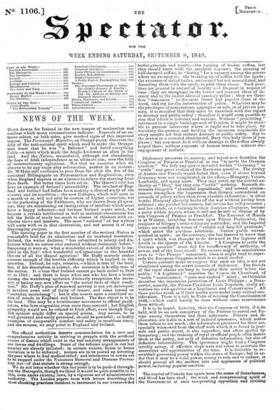Diplomacy preserves its secrecy, and report now describes the Congress
of Princes at Frankfort as one "to settle the German question." We defy any power included within "Germany ". to
settle" any great section of the European question. The rivalry of Austria and Prussia would forbid that, even if states beyond Germany were not complicated in the affair,—Hungary, Venice, Lombardy, and many more. They may patch up the central au- thority or "Diet," but they can " settle ' nothing. Kessuth de. flounces Giirgey's "shameful ingratitude," and "several circums stances strengthen the impression that GOrgey surrendered on grounds of policy rather than from absolute exhaustion: in other words, Hungary abruptly broke off the war without having been subdued ; she yielded her cannon, but retains her self-possession ; and her chiefs, on returning to their Austrian allegiance, become a party within Austria whom it will not be safe to dispose of by any Congress Of Princes at Frankfort. The Emperor of Russia is' at Warsaw, lavishing honours upon Prince Paskiewicz, the recipient of Gor„csey's semi-voluntary surrender; and the Imperial letters are couched in terms of "candid and deep-felt gratitude," which attest the previous solicitude. Venice yields unvart- quished in spirit; on the contrary, she has learned to know that a spirit which was thought to be drowned in the lagunes still dwells in the Queen of the Adriatic. "A Congress to settle the German question" must fail for insufficiency of authority, of power, and of the locus standi. Its success might be mischievous even to "the Princes" concerned, since it might tend to super- sede the European Congress which is so much needed.
Certain portents make us suppose that such an idea is not yet abandoned among the secret councils of diplomacy. The friends of the royal classes are busy in keeping their merits before the public: "A Legitimist" describes the Comte de Chambord, of noble " countenance, "pure and exalted" mind ; an Orleanist describes the ingenuous patriotism of Louis Philippe ; a Bona- partist, namely, the Prince-President Louis Napoleon, orally ad- vertises his own qualities 'as a Legitimist and Conservative! All these parties speak as if their merits were under some critical con- sideration. There is a talk in Paris of revising the Constitution of 1848,—which could hardly be done without some countenance from without.
It is to be hoped, however, that the Congress of 1850, if it be held, will be no new conspiracy of the Princes to parcel out Eu- rope among themselves and their adherents. Princes and di- plomatists are liable to a sort of judicial ignorance, which makes them refuse to see much ; the information presented for their use, specially winnowed from the chaff with which it is found in jour- nals and public report, is also imperfect, and often spoiled by tampering; and the training of royal or official people often makes them at the mercy, not only of defective information but also of defective informability. This ignorance might lead a Congress terribly astray, if effective steps were not taken to ascertain the necessities and opportunities of the time. It is desirable to re- establish governing power within the states of Europe ; but in or- der that it may be a valid power, strong to rule and to endure, it should possess all the modern aids and appliances of political power, including popular sanction.


























